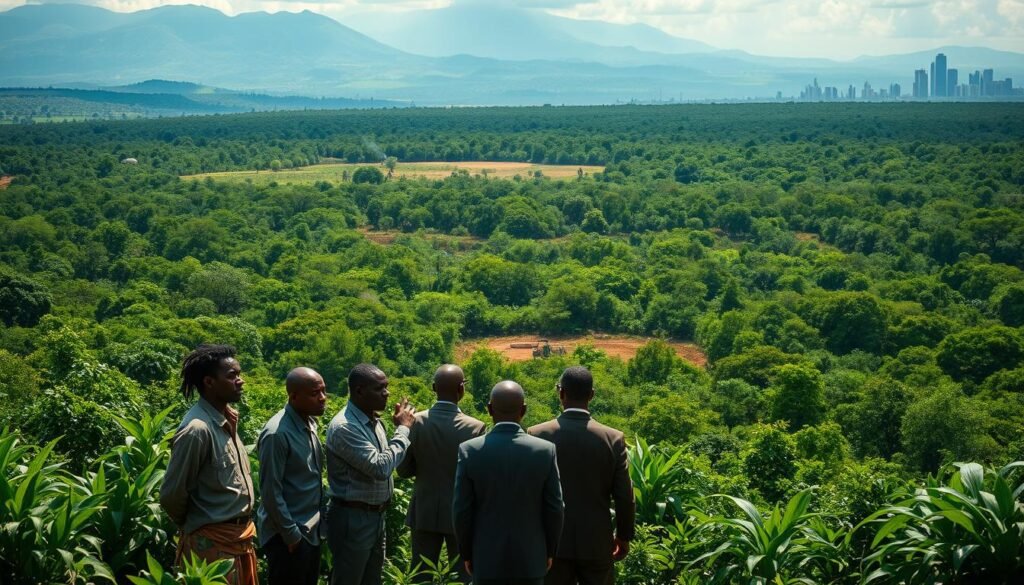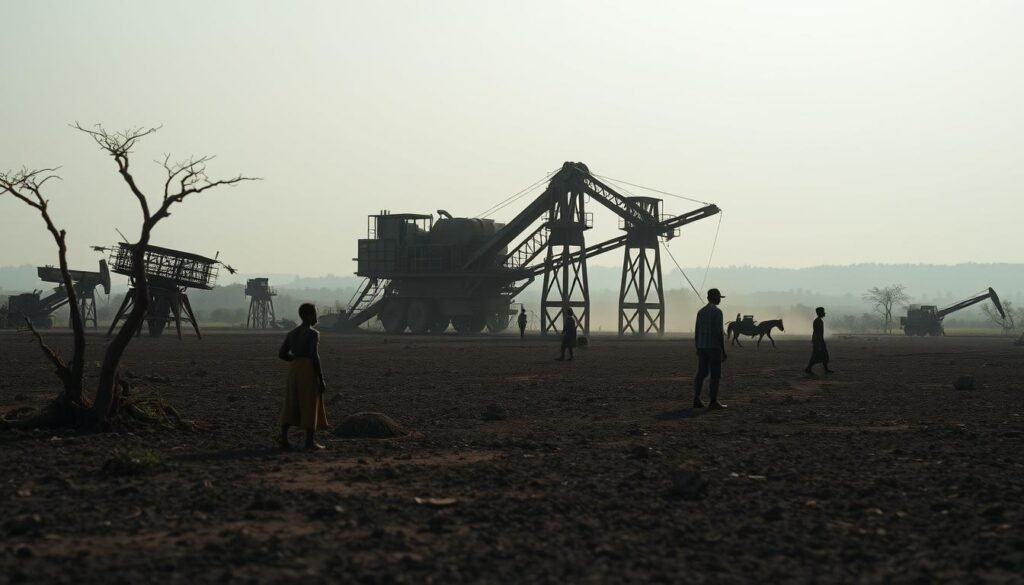As we face climate change, a big question comes up: Is it right to offset emissions in rich cities like Paris by planting trees in far-off places like Congo?
The idea of carbon colonialism is causing a lot of debate. Many say it lets rich countries keep polluting while poor ones deal with the environmental and social problems.
Do you think this method really helps cut down global emissions? Or is it just a way for polluters to feel better without actually doing much?
Key Takeaways
- The concept of carbon colonialism and its implications.
- How emissions offsetting works and its potential drawbacks.
- The impact of offsetting projects on local communities in Congo.
- The effectiveness of carbon offsetting in reducing global emissions.
- Alternative solutions to carbon offsetting.
The Carbon Offset Mechanism Explained
Have you heard of carbon offsetting? It’s a way for people or groups to make up for their carbon emissions. They do this by supporting projects that cut down emissions somewhere else.
Carbon Credits: The Basics
Carbon offsetting works through carbon credits. Each credit lets someone emit one ton of CO2 or similar gases. Companies or countries buy these credits to balance out their emissions.
The Global Carbon Market’s Rapid Expansion
The global carbon market is growing fast. This is because of stricter environmental rules and companies wanting to be green. More projects are popping up around the world to help.
Why Offsetting Appeals to Companies and Countries
Companies and countries like offsetting because it seems easy. They buy credits to say they’ve cut their emissions. They don’t have to change how they work much.
| Aspect | Theory | Reality |
|---|---|---|
| Carbon Credits | Represent a ton of CO2 reduction | Often criticized for lack of additionality |
| Global Market | Promotes emissions reduction globally | Faces issues with project verification |
| Offsetting Appeal | Easy way to claim emissions reduction | May deter from actual emissions cuts |
The carbon offset idea is good, but it has its flaws. Some say it lets polluters keep on polluting. As the market grows, fixing these problems is key to its success.
The Historical Context: Industrialization and Emissions
Western nations’ industrial growth has led to a big carbon debt. This debt affects climate inequality worldwide, hitting Africa hard. Understanding this history is key to grasping climate change and the need for carbon offsetting.
Western Development Through Carbon-Intensive Pathways
Western countries grew rich by using lots of fossil fuels. This choice led to a lot of greenhouse gas emissions. Today, this old way of growing still shapes global climate policies and the carbon market.
The Accumulated Carbon Debt of Developed Nations
Developed countries have built up a big carbon debt since the Industrial Revolution. This debt is a big part of why we face climate change today. It shows how past actions affect us now.
Africa’s Minimal Historical Contribution to Climate Change
African countries have not emitted much carbon historically. Yet, they face big climate change problems like droughts and floods. This shows how unfair climate change is and why we need fair solutions.
| Region | Historical Emissions | Current Climate Impact |
|---|---|---|
| Western Nations | High | Significant |
| African Countries | Low | Disproportionately High |
Carbon Hypocrisy: The West’s Convenient Solution
Carbon offsetting lets Western nations avoid their climate duties. It’s a way for them to keep polluting while blaming others. This makes you wonder how it works.
Comparing Emissions: Western Nations vs. African Countries
The gap in emissions between the West and Africa is huge. Americans produce about 16 tons of CO2 yearly. In contrast, many Africans produce less than 1 ton. This big difference makes you question fairness in emissions comparisons.
How Carbon Offsets Allow Continued Pollution in Wealthy Nations
Carbon offsets let rich countries fund projects to cut emissions elsewhere, often in poor countries. This way, they say they’re reducing their carbon footprint. But they’re not really cutting their own emissions. It’s like trusting that money spent on these projects really lowers emissions.
The Flawed Math Behind Emissions Equivalence
The math of emissions equivalence is wrong. It doesn’t consider the past pollution of rich countries. By saying a ton saved in Africa equals a ton emitted in Europe, it ignores the West’s long history of pollution. This lets rich countries keep polluting while claiming they’re offsetting.
In short, carbon offsetting is a form of carbon hypocrisy. It lets rich countries look green without really changing. True climate action needs more than just money. It requires a big change in how we use energy.
The Modern Scramble for African Resources
The demand for carbon credits is growing fast. This has led to a new rush for land in Africa. It’s like a modern version of the old scramble for resources.
Land Acquisitions for Carbon Sequestration Projects
Foreign groups are buying up lots of land in Africa for carbon projects. They plant trees or save forests to grab CO2. But, this worries many about the local environment and people.

Displacement of Indigenous Communities and Traditional Land Use
Land buys for carbon projects push out local people. These folks have lived off the land for ages. Now, they must move, causing big cultural and economic problems.
The Economic Imbalance in Carbon Credit Transactions
Carbon deals often favor the foreign investors. African countries face the environmental and social costs. Here’s a look at the unfair side of carbon credits.
| Transaction Component | Foreign Entities | African Countries |
|---|---|---|
| Carbon Credits | Earns revenue | Bears environmental cost |
| Land Acquisition | Acquires land | Loses land and resources |
| Economic Benefits | Reaps majority of benefits | Receives minimal benefits |
The rush for African resources shows we need a fair way to offset carbon. We must protect local communities and share the benefits more evenly.
Case Study: From Paris to Congo – Following the Carbon Money Trail
In Africa, Congo’s forests play a big role in fighting global warming. They help cities like Paris reduce their carbon footprint. This study looks at how money moves from Europe to Africa for carbon offsetting.
How European Emissions Get “Erased” in African Forests
Carbon offsetting lets countries and companies pay for their pollution by funding projects that cut emissions elsewhere. In Congo, this means European pollution is offset by saving forests. These projects are cheaper than cutting emissions in Europe. But, they raise big questions about fairness and success.
The Middlemen and Financial Beneficiaries
Many carbon credits involve middlemen who connect buyers in Europe with project developers in Africa. These middlemen take a big cut of the profits. This leaves local people with little money. It’s hard to see where the carbon money goes because of a lack of transparency.
Local Realities vs. Corporate Marketing
Companies say their carbon offsetting is a big step towards zero emissions. But, in Congo, things are different. Carbon projects can cause land conflicts and move people off their land. The gap between what companies say and what really happens shows we need fairer carbon offsetting.
Following the money from Paris to Congo shows we need to fix carbon offsetting. It must work for the planet and for local people.
Stifling African Development Under Environmental Pretexts
The push for environmental protection is being misused. It’s hurting African development under the name of climate action. Many don’t see how these policies affect African economies.
Denying Africa’s Industrialization Path
Africa’s right to grow industrially is being denied. Climate policies keep African countries poor. Western nations get to enjoy their industrial growth.
- Climate policies limit Africa’s industrial growth.
- Carbon offsetting lets rich nations pollute more.
Restricting Economic Growth
Climate policies, meant to help, actually hurt Africa’s economy. They stop the use of carbon-heavy tech. This slows down Africa’s industrial growth.
“The biggest threat to the planet is not climate change, but Africa’s lack of economic growth.” – A quote showing the need for fair climate action.
The Hidden Costs of Environmental Colonialism
Environmental colonialism has big hidden costs. It forces African countries to follow foreign environmental rules. This leads to the use of their resources, moving people, and stopping new projects.

Looking at climate policies’ effects on Africa, we see a need for change. We need a fair balance between protecting the environment and letting Africa grow economically.
Towards Global Climate Justice and Equitable Solutions
We need a big change to fight climate change. It’s important to find fair solutions for our planet’s future.
Rethinking Carbon Responsibility Based on Historical Emissions
We must change how we look at carbon emissions. Countries that have been around longer have emitted more. It’s key to remember this when making climate plans.
| Country | Historical Emissions (GtCO2) | Current Emissions (MtCO2) |
|---|---|---|
| United States | 509 | 5,416 |
| China | 284 | 9,357 |
| European Union | 477 | 3,355 |
Clean Technology Transfer as Reparation
One way to fix past emissions is to share clean tech. This helps countries move to a green economy.
Supporting African-Led Climate and Development Initiatives
Helping African-led climate efforts is key. It lets them create plans that fit their needs.
You can help by pushing for fair climate policies. Together, we can make a better world.
Conclusion: Breaking the Cycle of Carbon Colonialism
You’ve learned how carbon offsetting, like tree planting in the Congo, is a form of neocolonialism. It lets rich countries and companies keep polluting. They hide their pollution by saying they’re offsetting it.
This method ignores the pollution of the past and holds back African countries’ growth. It’s unfair.
To stop carbon colonialism, we need a fair way to fight climate change. We must remember the pollution of rich countries and fight for global justice. Supporting African-led efforts can make the shift to a cleaner economy fair.
We must move away from fake carbon offsets and really cut down on pollution. We need to make sure climate policies don’t hurt poor areas. This way, we can fight the climate crisis fairly and end carbon colonialism.

